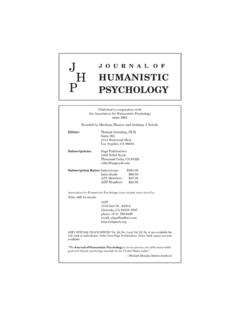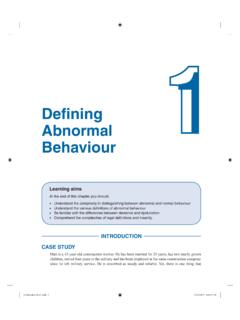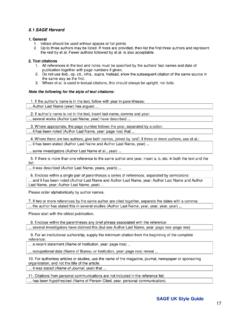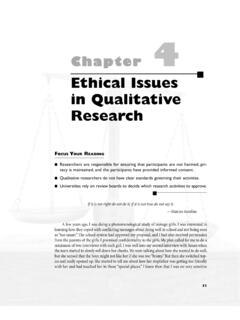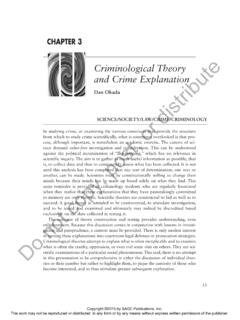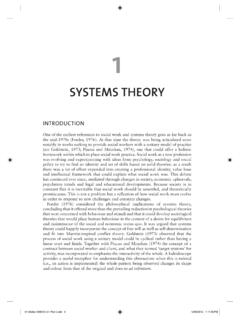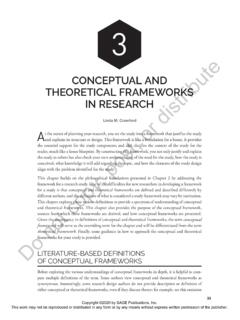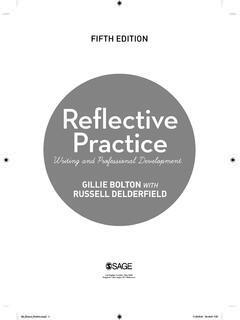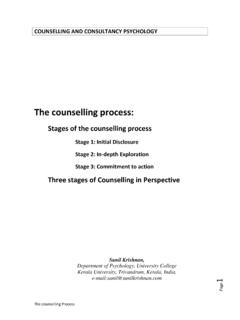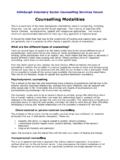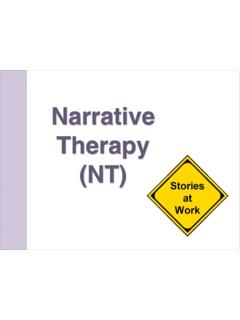Transcription of What Is Qualitative Research?
1 1 what Is Qualitative Research? CHAPTER OBJECTIVESBy the end of this chapter, you will be able to: vunderstand what is meant by Qualitative research vlink your research topic to an appropriate methodology vrecognise the advantages and disadvantages of both Qualitative and quan-titative methods vunderstand the diverse approaches underlying contemporary Qualitative IN SEARCH OF A WORKING DEFINITIONTo call yourself a Qualitative researcher settles surprisingly little. First, as we shall see at the end of this chapter, Qualitative research covers a wide range of different , even conflicting, activities.
2 Second, if the description is being used merely as some sort of negative epithet (saying what we are not, non-quantitative), then I am not clear how useful it is. As Grahame puts it: the notion that Qualitative research is non-quantitative is true but uninformative: we need more than a negative defi-nition (1999: 4). what , then, are the principal differences between quantitative and Qualitative research ? Table sets out some common , as Hammersley (1992) makes clear, each of the assumed differ-ences in Table are problematic as follows: 01-Silverman_4e-4241-Ch-01 (Part 1).
3 Indd 328/09/2011 12:30:15 PMpart one Theory and Method in Qualitative Research4 vQuantitative researchers clearly use words as well as numbers. For instance, they usually offer verbal interpretations of their statistical tables. It is also not true that numbers are absent from Qualitative research . Having discovered some phenomenon by Qualitative means, there is every reason to see how frequently it occurs (see the case study on cancer clinics later in this chapter). vQuantitative research is often concerned with meanings questionnaires or surveys are commonly designed to establish how people see themselves or oth-ers.
4 Qualitative researchers can be interested in behaviour just as much as how people see things. Many Qualitative studies examine how people interact with one another in particular settings like the workplace, a museum or an auction house (see Heath et al., 2010, discussed in Chapter 10). vThe standard, published quantitative study usually does begin with a hypothesis which it then seeks to test. However, it is becoming more common for qualita-tive researchers to begin with a hypothesis. My research on advice giving in HIV-test counselling (Silverman, 1997), discussed in Chapter 11, was based on a relevant earlier study.
5 After more than a century of Qualitative research , we would be in a bad way if we had no findings that were worthy of further study! vThe same applies to generalisations. As I argue later in this book, following Flyvbjerg (2004), we can make certain kinds of generalisations from case would be foolish, however, to maintain that there is no distinction between Qualitative and quantitative research . This can be seen clearly if we compare the format in different journals. Quantitative journals expect their authors to begin with a hypothesis which is then tested using accepted statistical measures on a large number of cases which are often randomly selected.
6 Much of the material consists of tables of numbers. The interpretation of such tables is usually postponed until a final section which is often called discussion . By contrast, the papers in Qualitative journals do not routinely begin with a hypothesis, the cases studied are usually far fewer in number and the authors interpretation is carried on throughout the writing. There is usually far greater attention paid here to the particular theory or model of Qualitative research which the author is using. This allows me to make some simple, working distinctions set out in Table TABLE Assumed characteristics of researchQualitative researchQuantitative researchUses wordsUses numbersConcerned with meaningsConcerned with behaviourInduces hypotheses from dataBegins with hypothesesCase studiesGeneralisationsSource: adapted from Hammersley, 199201-Silverman_4e-4241-Ch-01 (Part 1).
7 Indd 428/09/2011 12:30:15 PMWhat Is Qualitative Research? 5 Table attempts to paint a realistic picture of what most Qualitative research looks like of course, there are exceptions. However, research methods are not always a subject for rational debate. In the next section, you will see how people often make loaded assumptions about different research LOADED EVALUATIONS OF research METHODSYou may have had experience as a student of how different teachers and departments rate Qualitative and quantitative methods. Within psychology, for instance, there is a clear split between those who favour quantitative studies, often based on questionnaires or laboratory studies, and those who use qualita-tive methods to study interaction in the field (see Potter, 2011).
8 However, you also have to bear in mind that these methods are often evaluated differently. This is shown in Table which is drawn from the terms used by speakers at a confer-ence on research methods. Unfortunately, little has changed over the decades since shows how imprecise, evaluative considerations come into play when researchers describe Qualitative and quantitative methods. Depending on your TABLE Qualitative research : some simple characteristics1 Often begins with a single case, chosen because of its convenience or interest2 Often studies phenomena in the contexts in which they arise through observation and/or recording or the analysis of printed and Internet material3 Hypotheses are often generated from the analysis rather than stated at the outset4 There is no one agreed way to analyse your data.
9 Multiple research models exist ( grounded theory, constructionism, discourse analysis) and sometimes conflict with each other5 Where numbers are used, these are usually in the form of simple tabulations designed to identify deviant cases and do not lead to statistical correlations or testsTABLE Claimed features of Qualitative and quantitative methodQualitativeQuantitativeSoftHardFle xibleFixedSubjectiveObjectivePoliticalVa lue-freeCase studySurveySpeculativeHypothesis testingGroundedAbstractSource: Halfpenny, 1979: 79901-Silverman_4e-4241-Ch-01 (Part 1).indd 528/09/2011 12:30:15 PMpart one Theory and Method in Qualitative Research6point of view, Table might suggest that quantitative research was superior because, for example, it is value-free.
10 The implication here is that quantitative research simply objectively reports reality, whereas Qualitative research is influ-enced by the researcher s political values. Conversely, other people might argue that such value-freedom in social science is either undesirable or impossible. The same sort of argument can arise about flexibility . For some people, such flexibility encourages Qualitative researchers to be innovative. For others, flexibility might be criticised as meaning lack of structure. Conversely, being fixed gives such a structure to research but without , this is by no means a balanced argument.

